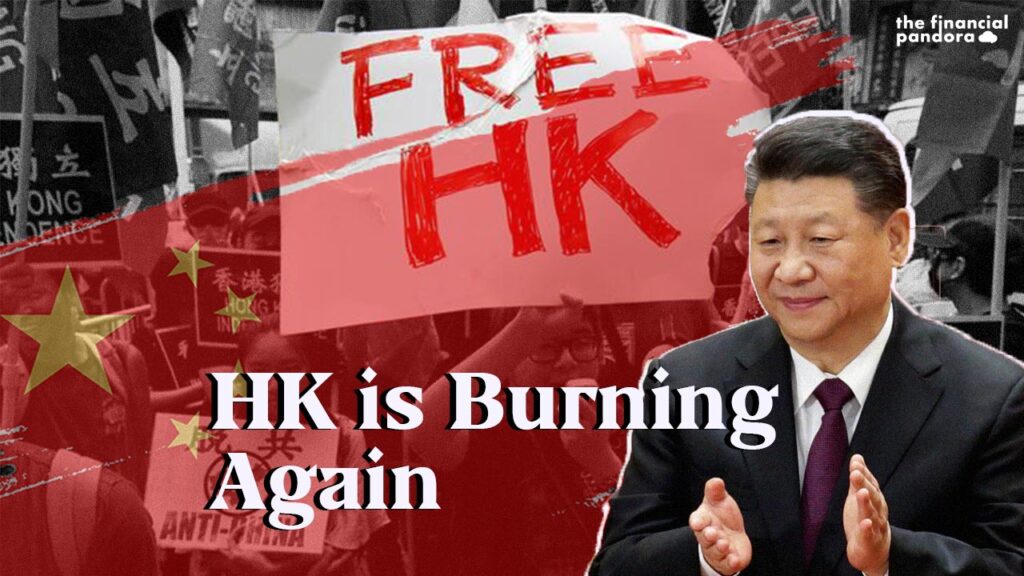I can’t help but think that every time I see Xi’s face what his next territorial demand will be.
XI: I want Taiwan (since Mao), Senkakus (2013), South China Sea (2015), Hong Kong (2020), Galwan of India (2020)… and so forth.
Next, China will demand Nepal, Bhutan, Cambodia, Myanmar and Sri Lanka, you never really know in which direction the wind will blow.
With the whole naming and shaming for irresponsibly handling coronavirus, China has undoubtedly become belligerent. India and Hong Kong are perhaps the epitome of this belligerence.
Hong Kong is burning again. The protestors are back, but this time China is in no mood to watch from the side-lines. The implementation of national security law on Hong Kong has raised grave concerns about the city’s democracy. The law proposed for Hong Kong bans treason, secession, sedition and subversion, in essence paves the way for China to deploy its own security forces to galvanize more freely in Hong Kong. Interestingly, even speaking against the new law is a violation of the law. If this is not communism in all its black glory, I wouldn’t know what is.
Will Hong Kong have to forfeit its special status?
It is disturbing to see China’s clandestine intentions, so much so that the central government’s own allies in Hong Kong were not aware of the policy until 48 hours before it was announced. The upsurge in Hong Kong’s pro-democracy movement is more closely linked to the developments in Taiwan, than is accredited in world media. The Taiwanese election results have given hope to the pro-democracy supporters in Hong Kong. To note, Taiwan has commented adversely about the law. However, to imagine that China will stop interfering in the territory’s domestic socio-political space is perhaps over-optimistic. In the near future, Hong Kong may just have to bid goodbye to its long-prided status as the world’s second-freest economy.
China has already started following the Covid-19 strategy – to trace, to quarantine and to eliminate. The new law allows the impressive AI and social media monitoring prowess to trace those involved with the protests, to quarantine (arrest) the protestors, and to eliminate the protests entirely by the draconian law.
Is Hong Kong the entrepot between China and the world?
Let me shed some light. From an agrarian economy to a global super-power, China’s evolution has been an economic triumph unlike any other.
A key aspect of China’s economic modernization and growth strategy during the 1980s and 1990s was to attract FDI into China to help boost the development of domestic firms. Investment by Chinese firms abroad was sharply restricted. However, in 2000, China’s leaders initiated a new “Go Out Policy” (go global strategy), which sought to encourage Chinese firms to invest overseas. One key factor driving this investment is China’s massive accumulation of foreign exchange reserves. This accumulation was due to firstly, opening up to foreign trade and investment and implementing free market reforms in 1980’s. Secondly, the large level of domestic savings has allowed China to support the high level of investments. As of today, Hong Kong is the leading destination for mainland China’s foreign direct investment (FDI) outflow.
Primarily, Hong Kong is China’s financial platform for FDI coming into and going out of China. According to the Ministry of Commerce of China, over 58% (around US$70 billion) of China’s non-financial outbound direct investment (ODI) flow went to Hong Kong in 2018. By the end of 2018, stock volume of China’s non-financial ODI in Hong Kong reached US$622 billion. The largest destinations of cumulative Chinese FDI outflows were Hong Kong (Around 52%), the Cayman Islands (13.9%), the British Virgin Islands (6.7%), and the United States (4%).
Secondarily, Hong Kong was home to 73% of mainland Chinese companies going public during the period 2010 to 2018. Most recently, Hong Kong witnessed the internet conglomerate Alibaba’s shares surge in HK’s secondary listing, making it the world’s largest listing in 2019. The Stock Exchange of Hong Kong, which is the fifth largest in the world, is now home to numerous Chinese companies’ stocks. Much of Chinese investments does not remain in Hong Kong. It is either repatriated to China as profits and funds or sent elsewhere in the rest of the world.
Now the question is why do mainland companies, many of which are state owned opt for listings in Hong Kong?
- Hong Kong has a registration-based IPO system, while China implemented this reform only on June 12,2020;
- The presence of capital controls and greater international exposure allows Hong Kong to serve as an entrepot for global development;
- Hong Kong allows capital to flow more freely compared to China’s strict curbs
With the ease of working in Hong Kong, do you think Shanghai or Shenzhen is even close to winning the competition?
Furthermore, Hong Kong has long been China’s principal offshore Renminbi centre. This clearly implies that Hong Kong has been crucial to China’s ambition to replace the U.S. Dollar as the world’s global currency.
However, China must know that preserving Hong Kong’s unique economy means more than allowing free enterprise. It entails a strong and unwavering commitment to its rule of law, the key to Hong Kong’s economic achievement.
What is brewing in Hong Kong since the implementation?
There are plenty of direct ways the law could backfire on economic freedom.
As the news of the law broke, people moved to purchase virtual private networks in order to evade any future website blocking and to protect their privacy of their communications. While others began closing their social media accounts because they fear their expression on anything could be used to charge them with separatism or subversion under the law.
It is likely that the Chinese security will be increasingly involved in enforcing the existing Personal Data Ordinance – the Internet service providers, telecommunication operators and data centre operators could face greater liability for user content, meaning they would be obliged to censor their platforms. They may also be required to hand over data to authorities. Even Mark Zuckerberg expressed concerns for the same, and that itself should tell you something.
Beijing’s reaction to expression of speech was exemplified in October,2019 regarding Daryl Morey (General Manager of Houston Rockets) tweet “Fight for freedom, stand with Hong Kong” that almost derailed the NBA’s billion-dollar business in China. All NBA activities in China were immediately frozen and commercial contracts were violated. Though activities are resumed Houston Rockets’ games are still banned. There are numerous other examples of how Beijing forces businesses to self-censor, including the August 2019 resignation of the chairman of Cathay Pacific Airways, following the participation of some of its employees in anti-government protests; HSBC’s being forced to make a fealty oath to Beijing regarding the new security law; and Marriott Hotel’s firing of a US employee over a tweet supporting Tibet.
Free flow of data is one of the chief causes for Hong Kong to be known as the financial hub. The law has already raised concerns regarding the Hong Kong government’s ability to implement the Australia-Hong Kong Free Trade Agreement as the agreement provides Australian businesses certainty to trade and invest in Hong Kong and of course to enjoy the high degree of autonomy. Wider law enforcement access to data will also limit Hong Kong’s chance of committing to free data flow arrangements in the future, whether it is in the context of the FTA, the Asia-Pacific Economic Cooperation (APEC) platform, or Comprehensive and Progressive Agreement for Trans-Pacific Partnership (CPTPP).
As forms of expression are suppressed in mainland and it forbids foreign interference without specifying the measure or where the boundaries lie, will downgrading a company’s rating put the business charter at risk? Will any news organisation be able to report any fraud committed by a Hong Kong company? Will the employee behaviour policies be refined to avoid upsetting the prowess?
The more Xi damages China’s liberal financial zone, the more the foreign companies generating millions of jobs in Hong Kong will question, why they should stay.
Where can Hong Kong protestors seek refuge?
The U.S. lawmakers introduced a bipartisan bill on July 1 that would give refugee status to Hong Kong residents. There will be no limit to the number of Hong Kong residents who qualify. Also, the opportunity to apply for citizenship would be valid for five years from the date of bill’s passage.
U.K. has also coordinated its response to China’s crackdown on Hong Kong. Australia too is actively considering providing safe haven to the residents.
Whilst the two above countries taking these steps may make you feel all good, to me, it just exposes the insincerity of western nations providing refuge to people, who are at a place where their money was. No limit to number of residents’ qualification? And the US put a number on Syrian refugees (10,000) who were also running from a very real and present threat to their lives – who didn’t have food to eat and water to bathe.
Nevertheless, these offers are unlikely to deter Xi from imposing the crushing law. Xi’s response has been particularly muscular as far as Hong Kong is concerned. This time they have taken a much more of a momentous step which could lead towards more turmoil and also erode Hong Kong’s status as a free economy. Such an eventuality, at the end of the day, will without a doubt, hurt the already troubled Chinese economy.
To Conclude:
China remains, to quote Churchill out of context, “a riddle wrapped in a mystery, inside an enigma”. Whether Xi is making alacrity because he sees the domestic and global flux as an opportunity or as a threat, cannot be said with any grade of confidence. The most likely scenario we will witness is the gradual decay of Hong Kong’s role as a financial centre, with some banks moving their operations directly to Shanghai – a trend that has been going on since Hong Kong’s handover and others moving most likely to Singapore. The U.S. will likely take away Hong Kong’s special trading status and apply export sanctions on certain technologies. And of course, there will be increased emigration from Hong Kong, as is already visible.
President Xi seems to have an inherent conviction in his inflexible tough stance, and as he has centralised power to an unprecedented level, there is no one else to share any blame for the policies enunciated by him. And after a few months of lull, will Xi be back with new laws? Or new territory demands?
Follow Us @




